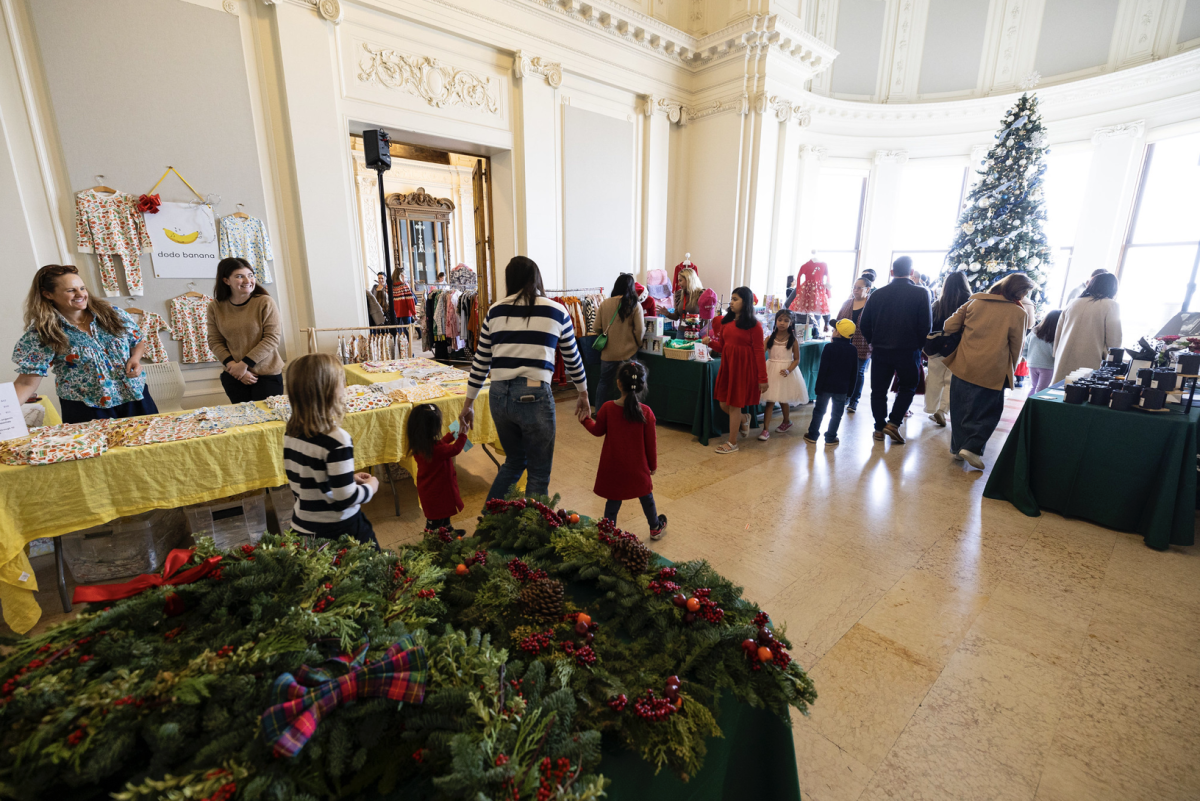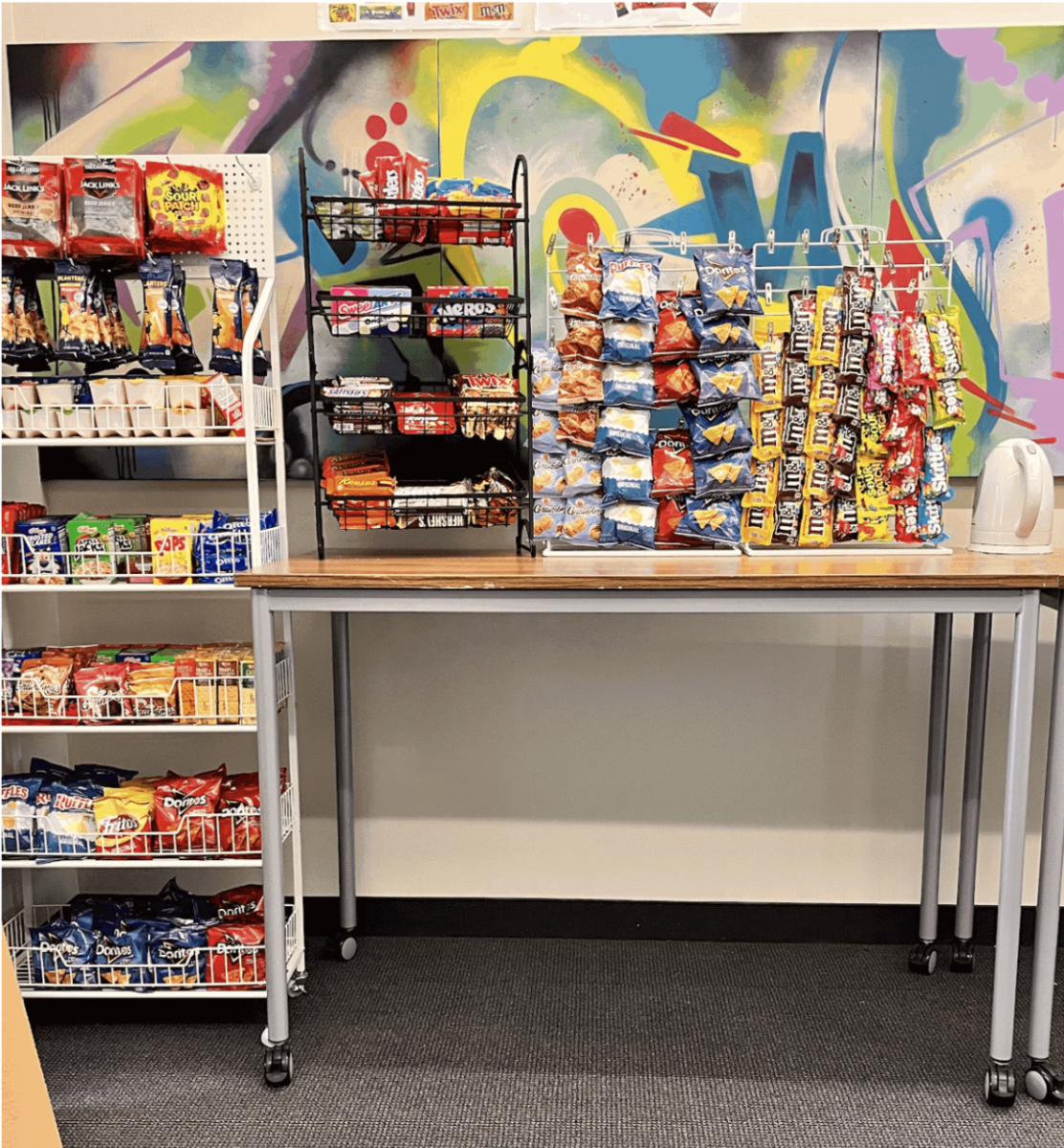Jovel Queirolo
Sacred Heart Editor
Ringing a bell in front of a Lucky supermarket was lonely and miserable, but in five hours I began to understand why this holiday season is less of a season of giving. The weak economy’s impact is written on the faces of the hundreds of people who walk by my kettle. I was asking people to give, hoping to receive.
But this is a season of wishing.
Bell ringers today are different from the first volunteers who set up kettles on streets over the holidays in 1891 to raise money for San Francisco’s poor. I arrive at a Salvation Army office in the Mission District that is short on volunteers. Some of the kettle workers I meet are paid because of volunteer shortages or a worker’s need for some extra money.
I am a given red apron with “I am a bell ringer” printed in white letters, a Santa hat, a big red kettle and a small white bell with a sound louder than its size.
Almost all the people I work with are regular kettle workers — older men and women speaking fast Spanish and laughing at inside jokes. I quickly make friends with the one other high school volunteer, Gustavo, before we are herded into a van along with kettle stands that clank noisily in the trunk. The six of us are blessed with the Sign of the Cross by a volunteer coordinator before the van pulls out.
Our posts are not in the City. One man is dropped off at a Lucky supermarket in Daly City. The rest of us are sent to chain supermarkets and pharmacies in Millbrae and Burlingame. Gustavo and I are to be posted outside another Lucky in Millbrae – one of us at each entrance to the store.
The driver parks, we set up our stands with their signs reading “Doing the most good” and began our 5-hour shift. The rules are simple. I am allowed to say “Happy holidays” and “Thank you.” I have a pamphlet for people who need information on what the organization does.
The Salvation Army’s mission is to meet human needs with help and stability. I am told to talk about the organization feeding seniors, putting together afterschool programs and giving away food on Fridays, the Mission office’s busiest day. But I don’t say much. No one asks.
I stand next to a fenced area Lucky is using to sell its Christmas trees. The smell of the trees and the sunny day make my first few minutes easy. Standing next to trees, I realize how for many people, I have become another piece of Christmas. As a bell ringer, I represent a giving spirit — a spirit that makes many uncomfortable.
After my first half-hour at work, it is noticeable. Only a handful of people actually smile and give a donation to which I promptly recite my “Thank you” and “Happy holidays.” After the first hour my right foot falls asleep. A Lucky employee pushing carts chuckled at my bell and says, “I guess both of our jobs suck equally.”
When people walk by a high school student with a bell, they don’t see people lined out the door of a Salvation Army station waiting for food or clothes or a place to let their children play. They may not even see my sign. Some people pass without a second glance. But the most interesting are the ones who try to look down or away, realize that they can’t, and scuttle past me retreating through the automatic doors — afraid to look me in the eye.
It’s a day of wishing and excuses. Every time a customer walks by, I watch hands reach into a pocket or purse and I wish as hard as I can that a dollar or two comes out. If I don’t even get a nod, I wonder what the excuse is. If they drop money into the kettle I wish even harder that they give again. It’s not enough to give once. People aren’t going to stop being needy.
People of all age groups give except for teenagers. It is upsetting to see not one high school student drop a donation into my kettle. I see many rush by, too cool to give. Two teenage girls walk by with can of coins. A few seconds later, I hear them dumping into a Coinstar machine to be turned into bills.
I meet some interesting characters. A man yells, “Why don’t you ask Pelosi for money cause she’s giving to everyone else — or ask that Communist Obama.”
Two hours into my shift, the sun is getting hot. My bell is occasionally drowned out by shopping carts or the chainsaw on trees. I can see Gustavo’s feet sticking out over by the other entrance. He sat down. I keep ringing, and get a few smiles.
A little boy asks his mom, “Who is that?”
“Oh, that’s a bell ringer,” she replies. I snap out of a daze realizing I’ve just been labeled as bell ringer. She is not bitter, but comforting. Her tone is one of admiration.
He stares at me for a long time so, probably against the rules, I let him ring the bell. He grins and shakes it forcefully and is about to run off with it, but his mom grabs it away before he sets off to see which Christmas tree his dad had chosen.
I wonder why he stared so long. Maybe his mother’s words left him wondering what unspoken needs his mother’s coins would pay for. He looked up at me, like a kid does at a hero. The Salvation Army is an unspoken Superman, “Doing the most good.”
It is hour four. The Christmas tree lot thins and the sun is beginning to set over them. I’ve watched tree drama all day. One woman talks me through the whole process of her fight with an employee over a tree she wants. She waits two hours for a tree. She never once donates.
“You’ve been here almost as long as me,” I joke. She laughs and goes on about how terrible the service is and how she wishes she had gone somewhere else – another wish.
“Especially in this season of giving,” she said ironically. “How can these people be so difficult? Why can’t they just give me my tree?”
What I still struggle to understand it how she spent two hours and $40 on a tree without dropping a few coins into a kettle for people who have nothing. Anyone can refrain from buying one less ornament and give someone a place to sleep or something to eat.
Half an hour left, I can’t help but keep shifting weight from foot to foot. I can smell people’s dinner cooking. I start thinking about the day. Maybe people get stressed-out around Christmas because they are uncomfortable with giving. More people gave than I expected, but more could have given.
I think about my bell which I begin to fear will haunt me long after I have stopped ringing it. The bell is a happy part of Christmas, or an annoying noise outside supermarkets. But whether or not people like it, they hear it. This bell is an alarm. It gets people’s attention. Some are ready to hear it and some don’t understand why they should give. They have their own wishes to make come true.
We take down our stands and get picked up around 5 p.m. Everyone is tired and our stomachs are empty, but our kettles are full. Back in the City, we put away the bells, take off our aprons and hats and go home.
When I close my eyes to sleep that night, all I hear is my voice saying, “Happy holidays, thank you” and that little white bell ringing. The one in every 10 people who dropped money in the kettle can’t keep the “season of giving” alive. Those little boys and girls will grow into teenagers too cool to give. The elderly will pass on. And there will always be the woman with her wallet flashing as she struts by with her chin up – wishing I wasn’t in her way.








